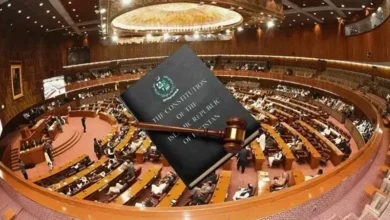By Syed Muhammad Ilyas
The United Nations General Assembly adopted the Declaration of the Rights of the Children in 1959, which defines children’s rights to protection, education, healthcare, shelter and good nutrition. The declaration served as a foundational document in the development of international law related to the child rights. It has influenced national legislations and policies around the world, guiding efforts to protect and promote the rights of the children in diverse contexts.
Again in 1989, the world leaders made a historic commitment to the world children by adopting the UN Convention on the Rights of the Child. The Convention explains the rights of the child alongwith the responsibilities of the governments.
In Pakistan too, over the years, there has been a growing realization to improve the lot of children, who forms a considerably large percentage of our population. It has led to consistent efforts to improve the legal and institutional framework for protection of their rights. Most significantly, the office of the Wafaqi Mohtasib has emerged on the forefront to take up the cudgels on behalf of the children by gearing its efforts towards their welfare. The Federal Ombudsman’s commitment to the promotion and protection of the child rights has been unwavering.
In view of the growing challenges impacting the welfare of children, the Office of the Grievance Commissioner for Children (OGCC) has endeavored to fulfil the Wafaqi Mohtasib’s mandate to “diagnose, investigate, redress and rectify” grievances to identify their underlying causes and develop strategies to eradicate them. The inherent objective is to fulfil domestic and international obligations through a consultative process with the stakeholders.
Pakistan has a population of over 240 million, 58% of which comprises children and adolescent. The major challenge for the country is how to cater to their needs in at least four areas (a) child health and wellbeing (b) child nutrition and food security as the situation of food security has further exacerbated due to 2022 floods and the impact of climate change (c) basic education and schooling as Pakistan has a fairly large number of out of school children (d) child protection and welfare, which happens to be the most precarious area in view of growing cases of child trafficking, child labour and other undesirable activities including the cybercrimes against children.
Within the framework of the child rights, the OGCC is performing the role of an oversight body that is keeping a watch over the state of children in Pakistan. The key strategy involve, inter alia, monitoring of media reports to identify cases of violence against children and to achieve the defined objective by facilitating interaction with all stakeholders including provincial authorities at various levels. With the foregoing in view, the following major strategic initiatives have been taken : (i) Booklet titled Promotion and Protection of Child Rights As an awareness raising initiative, a book titled “Promotion and Protection of Child Rights” have been published. It is a comprehensive document about the OGCC. (ii) Redressal of cases handled by OGCC In compliance of its task of monitoring cases of violence against children and the redressal, the OGCC’s monitors media for identifying cases of violence against children. (iii) Report on inquiry into the plight of Street Children in ICT The report was launched in October 2022. Its recommendations fall within the domain the administrative/public sector requiring legislative action, support of private sector and monitoring by the WMS. These have been sent to the relevant authorities which are at various stages of implementation. The Federal Directorate of Education (FDE), in collaboration with NGOs, is sharing the responsibility of free and compulsory education for the street children across ICT. It has managed to enroll nearly 18000 children in existing schools besides establishing 42 non-formal education centres and 06 technical labs in collaboration with NAVTTC. (iv) Efforts to curb cybercrimes against children The OGCC has vigorously pursued the issue of prevention of cybercrimes against children and has focused on four main areas: (a) awareness raising and media sensitization (b) advocacy and capacity building (c) legal reforms, and (d) educational reforms
Awareness raising and media sensitization has been an ongoing endeavor with public service messages regularly being disseminated through PEMRA, PTV, PBC, PTA and other social media sources. Similarly in collaboration with the FIA, Cybercrime Wing, the dissemination and information on safeguarding the children from the threat of cybercrimes has been under taken within ICT. A one day seminar was also organized by the organization in collaboration with the COMSATS University, Islamabad on the topic of “threats of cybercrime – growing vulnerabilities of societies” on 30 November, 2023, which was attended by the representatives from the various government ministries, agencies and stakeholders.
It emphasized that the evolving nature of technology combating cybercrimes has acquired urgency, which requires continuous adaptation, innovation and collaboration across sectors. The Office of the Wafaqi Mohtasib is cognizant of its role and responsibility as a catalyst and is ready to explore all opportunities to play its part. It may also be pointed out that a help line No.1056 is also available for reporting the cases pertaining to the children. (v) Legal Reforms and Child Protection * The passing of the Zainab alert Response and Recovery Act 2020 by the Parliament reflects a pivotal steps in the legal reforms for child protection in Pakistan. Named after Zainab Ansari, whose tragic case sparked public outrage this act establishes a comprehensive system to swiftly alert, respond or recover the missing or abducted children. * Similarly a bill on the Prevention and Control of Cybercrimes against Children/Criminal Law Amendment Act was adopted by the Parliament on 18th July, 2023 which testifies to the continuous efforts of the Wafaqi Mohtasib in adapting legal frameworks to modern challenges.
The National Committee on Children (NCC) is also an important forum established by the Wafaqi Mohtasib, which functions in advisory capacity. Its mandate is to monitor the status of the rights of children especially those at risk and to redress their grievances through OGCC in addition to addressing systemic issues through consultations with the stakeholders. It is expected to provide quality input for developing sound strategies to bless the children with a better future.
** **











